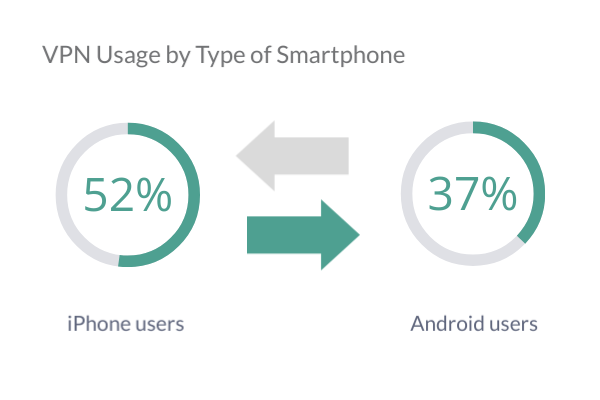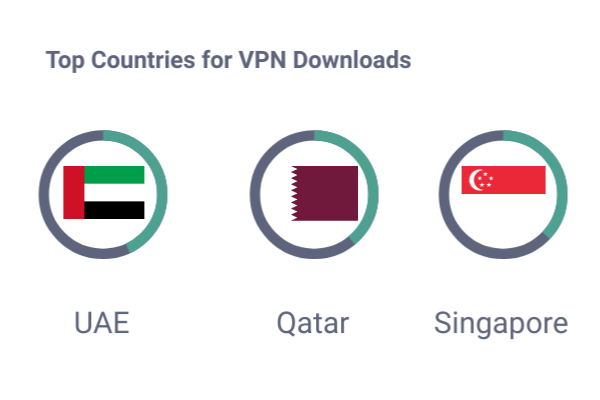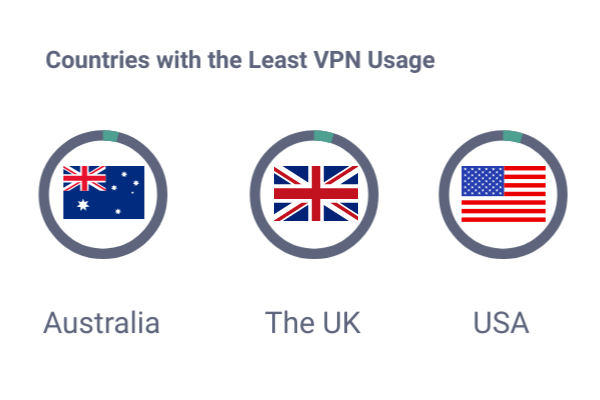

Updated · Feb 11, 2024
Updated · Jan 02, 2024
Aditya is an Azure DevOps and Infrastructure Virtualization Architect with experience in automation,... | See full bio
April is a proficient content writer with a knack for research and communication. With a keen eye fo... | See full bio
When VPNs first appeared, it was used mainly by businesses. However, the tool has recently seen relevance due to mainstream use. Especially now that online privacy and censorship is a hot topic, the use of VPNs has skyrocketed.
VPNs are useful for various reasons. They help you access geo-restricted content, surf the web anonymously, save money on shopping, and many others.
If you’re one of the many internet users contemplating using a VPN service, this article is for you. Let’s dive in!
Editor's Pick
|
Since its creation 27 years ago, VPNs have been internet users’ go-to for data encryption and security. VPNs help you use another server, usually from a different country, to access the internet.
Aside from unlocking geo-locked content, VPNs allow you to access websites while keeping you anonymous. Its use has come to be associated with privacy and internet security.
Here are VPN statistics showing how prominent and valuable the tool has become.
(Top10VPN, Surfshark)
The Global VPN Usage Report 2020 estimates that there are 1.6 billion VPN users worldwide, accounting for around 20% of the global population.

The data above accounts for VPN market penetration in countries with more than 10%, suggesting that unaccounted users may make up a bigger percentage. These numbers also reflect each country's VPN market size.
In mentioning the VPN market, it is necessary to know that the existing VPNs offer varying services and prices.
(Forbes, Security, Surfshark)
Research from the Forbes Advisory suggested that almost half (47%) of VPN users are availing of the technology free of charge. Meanwhile, 26% of the users opt to personally pay for the features of a Paid VPN, while 24% avail said premium features thru the initiatives of their employers.
The differences between free and premium VPNs are significant. Security says 60% of free users have connectivity and security issues. Free VPNs don't ensure internet security or privacy; they sell users' data to make money, according to Surfshark.
|
👍 Helpful Article: VPNs are great tools to keep you safe while you surf online. However, navigating through the decisions involved in getting one can be overwhelming. Check out our beginner-friendly articles to know more: You can also check out our helpful VPN brand reviews here. |
VPNs are awesome tools for anyone online. However, they appeal to certain users more than others.
VPNs are legal in the US and most other countries but not so much in others. For example. they are heavily regulated in China, Egypt, Iran, and Myanmar. However, that hasn’t exactly stopped them from using VPNs. China alone has 148 million internet users who have used VPNs to access restricted content.
With that, who else makes up VPN tech’s user base? Let’s check out the rest of our article!
(Security, Top10VPN, GlobalWebIndex, Earthweb, Surfshark)
Although VPN usage is, in essence, anonymous, studies from the available data have suggested that above half of the users are male. However, conflicting results from different sites talking on the actual data percentage vary from 36%-62% of Male users, which is still significant compared to Female users (26%-38%).
(GlobalWebIndex)
As per the Global Web Index, around 3/4 of the users' population makes up the user base. The report states that Gen Zs take the lead in using VPNs, followed by late Millenials.
VPN users’ age ranges are:

This can more or less be attributed to the perceived notion that younger generations are simply more adept at technology than the relatively older generations.
(Surfshark, GitnuxBlog)
The Asia-Pacific region hosts three of the biggest VPN Industries in the world. According to Surfshark, the countries of India, China, and Indonesia are ranked first to third in terms of their VPN Market Size.
Gitnux Blog found that India's VPN market amounts to $16.5 billion, surpassing China's $12.9 billion, and Indonesia ranking 3rd with $ 5.7 billion. These figures are influenced by high population and strong government regulations, which is why the tool is often utilized.
VPNs are used on cellphones, PCs, laptops, smart TVs, and other internet-capable devices. The technology has the potential to drastically transform how internet users think about their data, particularly in terms of privacy and security.
Here are some statistics on VPN usage per device:
(Top10VPN, Surfshark, Security)
While it's essential to learn about the VPN Industry in general, one exciting aspect embedded in VPN statistics is the choice of devices on which the technology is harnessed.
Alt tag: An infographic showing VPN usage by type of device.
A large percentage of the user base's choice of device for browsing and doing internet-related activities are through:
With more than 3.5 billion smartphone users globally, it’s no wonder VPNs are popular on their pocket-sized devices. They are especially advantageous for smartphone users connecting to public networks, such as public Wi-Fi networks, as they add an extra layer of protection by encrypting the data transmitted between the device and the network.
(Top10VPN)
Data from the Global VPN Usage Report 2020 shows the following about VPN usage by device:
The increased popularity of VPNs in smartphones is likely due to the tool's popularity on the internet. VPN companies sponsor many influencers and content creators. On top of that, their rise can also be attributed to current trends in data privacy and security awareness among users.
(Forbes, Security)
VPNs are popular among Apple users, with over a billion active iPhones worldwide.
52% of the respondents answered that they were using an iOS device, while 3% of the users were on a MacOS.

On the other hand, Android VPN Users were 37% of the respondents. Lastly, 6% of the respondents stated they were using Windows OS.
Data management is an essential policy for workplaces and businesses. Sensitive data and information are always at the forefront of communications. Because of this, using VPN can shift how any business conducts its activities.
(Forbes)
According to a Forbes Advisory study, more than half of their respondents used VPNs for business. However, according to the report, just a small minority of individuals in the top 50% utilize technology primarily for work.

It also reveals that their employers require 16% of users to utilize the technology, and only 6% of respondents said they use VPNs to secure an employer's data.
|
👍 Helpful Article: Interested in reading more about tech and business? Dive into these articles: |
(Security)
Security’s 3rd Annual VPN Market Report in 2022 reveals that most professional VPN use is due to workplace compliance (70%) and securing access to corporate networks (62%)
Other top reasons for VPN usage are:
It should be noted that the survey conducted allowed for multiple selections.
One of VPN's best features is bypassing most network restrictions. Depending on the particular VPN and the country the user is located in, an individual can circumvent certain features previously disabled by their country restrictions.
This grants users access to various things, such as entertainment content like shows and movies, blocked from airing in specific countries and areas.
In other cases, the tool can access websites outright banned by some countries. Below are some notable statistics about countries with the highest VPN statistic rates.
(AtlasVPN)
AtlasVPN's analysis of VPN usage in 85 countries from 2020 to 2022, the UAE has recorded the highest adoption index of VPNs.

The country makes up 43.18% of total VPN downloads. On the other hand, ranking second and third are Qatar and Singapore, with rates of 39.2% and 37.11%, respectively.
Considering its internet users' profile and culture, the Asia-Pacific Region ranks highest at 35%. The Middle East and Africa are second with a 35% usage rate.
Internet users in these regions tend to be younger and more tech-savvy than the general population. Secondly, culture contributes to the rankings, as within these regions are countries wherein VPN is used to access content from other countries.
|
🎉 Fun Fact: Many people use VPNs to get around geo-blocking to access media content restricted from their location due to censorship or copyright issues. |
(GlobalWebIndex, Security)
Indonesia has the greatest VPN usage rate, followed by India (45%) and Saudi Arabia (44%), which is only a percentage point away from tying with India. This corresponds to the prevalent internet access restrictions in stated countries.
(ISEmag, Cartesian)
COVID-19 marked a paradigm shift in the global health sector and how the government and businesses operated. According to studies from Statista, ISE, and Cartesian, there was a correlation between countries with alarmingly high cases of COVID-19 and the increase in VPN popularity.
Reports showed that VPN usage rates in Italy increased by a massive 175%. The United States followed suit with a significant 124% increase, followed by countries of Spain and Germany with 58% and 40% increases in usage rates, respectively.
While the features and services that VPN offers provide a valuable option that internet users can subscribe to, there are countries wherein its usage may be unnecessary.
There are many reasons for the low adoption rates of VPNs, such as:
VPN usage rates may vary dramatically from country to country, depending on a combination of these factors. Let’s check out the stats from low-usage countries!
(Geosurf)
According to a study by Geosurf, four countries have a below 10% VPN usage rate.

Those countries ranked lowest accordingly would be Australia (4%), the United States and the United Kingdom (5%), and Germany with 6% VPN usage.
(AtlasVPN)
Based on the research conducted by the Atlas VPN Team, the countries of Japan, Thailand, and Nigeria have the lowest VPN Adoption rate, all scoring below 4%, with Japan having a 1.48% adoption, Thailand with 1.91%, and Nigeria with a low 3.47% VPN adoption rates.
|
🎉 Fun Fact: Despite its reputation as a high-tech country, Japan also has one of the lowest daily screen time in the world, with only 325 minutes of daily exposure. |
The Virtual Private Network is more than just a way to hide your browsing history and make you virtually untraceable. It’s also a powerful tool that everyone who cares deeply for their data should utilize. Its emergence indicates that our society's functioning and governing sectors have realized the importance of protecting and securing our data.
Only time will tell whether VPNs will continue to expand its user base. Specific advantages and downsides are still being contested internally for its users and would-be users, considering the internet services it can unlock compared to the price it gives.
With the statistics, facts, and information provided herein, the Virtual Private Network has earned its place in internet culture and the meta.
The technology encrypts your data, whether messages, personal information, content, etc., on your device (Smartphones, Smart TVs, PCs/Laptops, etc.). The VPN transfers said data to the VPN service provider's servers through a safe and secure channel.
VPN services can be acquired via subscriptions and free trials. Different VPNs are available for download from various websites, the Google Play Store, and the App Store.
It depends on which country you reside in. VPNs are basically legal in most Western countries. However, some countries with authoritarian regimes have policies that restrict, and sometimes even outlaw, the use and sale of VPNs.
No. Having absolute anonymity on the internet, even through a VPN, is virtually impossible. The notion of complete anonymity via VPN is a misconception, commonly AND falsely advertised by many VPN providers. What VPN does is protect your online privacy data by encrypting the data. Still, it won't be able to make you 100% anonymous online.
Your email address will not be published.
Updated · Feb 11, 2024
Updated · Feb 11, 2024
Updated · Feb 08, 2024
Updated · Feb 05, 2024



